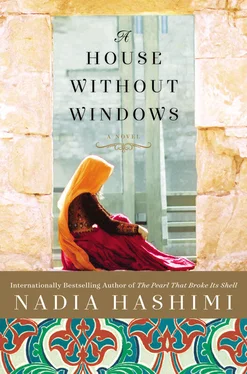Zeba’s breaths quickened. She bit her tongue.
The mullah took a sip of his tea, drawing it through his pursed lips in an obnoxious slurp that made Zeba want to hurl his cup against the trunk of the acacia tree.
“He is a sick man. When his family brought him to me, he spoke only to demons that no one else could see. He could not even answer his mother or father. But in the twenty-nine days he’s spent here, he’s shown remarkable improvement. This is what I do,” he said, with a regal wave of his hand. “It’s my calling. I have given up. . so much to devote myself to this work. Sometimes we have to make sacrifices to find our true naseeb, do you understand? God has instructed me to do this work, and it is for me to obey. I make people well here.”
Zeba felt her stomach tighten into a knot. The hairs on her arms prickled. Within those cells was the purest of solitude. From the openings, the ill could see the jagged line of mountains that separated this world from the next.
Zeba could see in the mullah’s eyes that he’d already reached his conclusion. Anything she said at this point made no difference. Yusuf would be surprised, but Zeba was not. That was the problem with Yusuf. He devised plans and expected the rest of the world to fall into place.
The lines came to her in a flash:
A woman indignant must suffer from madness.
That ignorant guess is the cause of our sadness!
Yusuf and the prosecutor were at the doorway. They’d grown impatient, and small talk was a chore, especially while the mullah’s son sat mutely in the corner of the room.
The prosecutor cleared his throat.
“Mullah- sahib, I don’t mean to interrupt, but. .”
The mullah glanced in their direction and took another loud slurp of his tea.
“Gentlemen,” he said with his eyes on Zeba. “You are free to return to the prison, but this woman is staying here with me.”
“BUT. . BUT. . BUT FORTY DAYS?” YUSUF STAMMERED. “AFTER forty days, we’ll be dragging her corpse out of that place! Is this your plan for sentencing her?”
Qazi Najeeb was nonplussed. He scratched at the back of his neck and looked, distractedly, at a land deed on his desk. He squinted his eyes to get a better look at the list of signatures on the bottom. He needed to settle this property dispute in the next few days or he could safely anticipate another murder being committed.
“Young man, you’re out of line speaking to me that way.”
It had been one week since they’d taken Zeba to the shrine. For seven days, Yusuf had been pacing outside the judge’s office. The guards, two lanky men in their twenties with holstered guns on their hips, watched him in amusement as he intercepted the judge on his way in. There were no other judges to beseech, and the chances of bumping this particular plea to an appellate court were next to nothing. Yusuf softened his tone.
“Please, Your Honor. I’m asking you to consider her well-being. We cannot conduct a fair trial if she is going to be starved and chained for forty days.”
“Forty days is the standard treatment period. Mullah Habibullah surely explained to you that Zeba is not his first patient. He’s been treating people there for years and has a very good reputation in the area.” The judge was matter-of-fact about the situation, as if he’d not been surprised at all to hear the mullah had decided to keep Zeba for treatment.
The prosecutor scoffed.
“This is exactly what you wanted, isn’t it?” he accused from the comfort of the floral armchair. He uncrossed and recrossed his thin legs, his knees jutting out like beaks as he leaned forward to toss his manila file on the coffee table. “You wanted someone to say that she was crazy and you got it. Now she’s getting treatment for it, just as you said she would if she were a defendant in America. If anyone should be upset with what’s happened here, it’s me.”
Yusuf couldn’t believe the turn this case had taken. As if the justice system wasn’t bad enough, now he had to contend with the opinion of the town shaman. He huffed, hands on his hips and his necktie loosened.
Gulnaz had accompanied Yusuf in this visit to the judge. While Yusuf had dreaded telling her what the mullah and the judge had decided to do with Zeba, Gulnaz had taken the news better than he’d expected. They’d been in the interview room of the prison and she’d put both hands on her temples and lowered her head. When she finally looked up, Yusuf saw no tears — merely grim determination.
“God help her,” Gulnaz had hissed before leaving the room, implying surely that no one else had.
She was more talkative today.
“Qazi- sahib, what exactly did this. . this. . mullah say about my daughter’s condition?”
The judge turned his attention to Gulnaz. He wondered if she might have taken extra care to dress for this meeting. Had she thought of him as she slipped on her brassiere? Her brows drew close ever so slightly, so the judge cleared his throat and mind, worried she might have just read his thoughts.
“Since interviewing her that first day, he’s spent time observing her. What he explained to me, he’s also written in this report that was sent over here by a messenger.” By “report,” the judge meant a paragraph scrawled on a sheet of a schoolboy’s notebook and by “messenger,” he meant the mullah’s own son, the same boy who had served the lawyers tea. “In his professional opinion, she is suffering from a very deep mental illness and he thinks it’s unlikely she was in her right mind at the time her husband was killed. The good news is that he believes he can help her heal.”
Yusuf sat back down in his chair and breathed deeply. How could he get Zeba out of that dungeon without tossing the entire case into the prosecutor’s hands?
“With all due respect, Your Honor, he is not a physician and can’t really make that assessment. I wanted to get a person with a medical degree to evaluate her. The hospital is not that far away. If we can have her sent over there, they have two physicians on staff who are qualified and have been treating people suffering from all kinds of mental problems. They even have an inpatient unit where they keep people and provide recognized treatment—”
Gulnaz interrupted her daughter’s lawyer.
“Unlike this young lawyer, I don’t doubt Mullah- sahib ’s qualifications.” Her voice was firm and unwavering. She looked directly at the judge. “In fact, I am so confident in his skills that I believe he will be able to manage her condition in less than forty days. You will please pass along my thoughts to him. I’ve heard she’s the only woman being held at the shrine right now and, as you can imagine, I’m concerned about her welfare there. Those are uneasy conditions for a female.”
“The conditions are designed to be what is necessary for the treatment of the patient,” the qazi explained gently. “It’s been a safe treatment for many, and he will keep a close eye on her.”
“So what does this mean for her case, then? We’ve already reviewed the penal code. If she’s been declared insane by a source you trust, then she cannot be convicted of this crime,” Yusuf insisted.
“For now,” corrected the prosecutor. “This is just as you said. Get her treatment and then she can be tried and convicted. And she will be despite this delay.”
“My friends, we are making history,” Qazi Najeeb said proudly. He looked around the room with the glow of a chemist who’d just synthesized a novel compound. “We are carrying out true justice as it has been delineated in the procedural code. This is a new age for the judicial system, young men. I never thought I would see it in my lifetime. We are leaders, we three!”
Читать дальше











